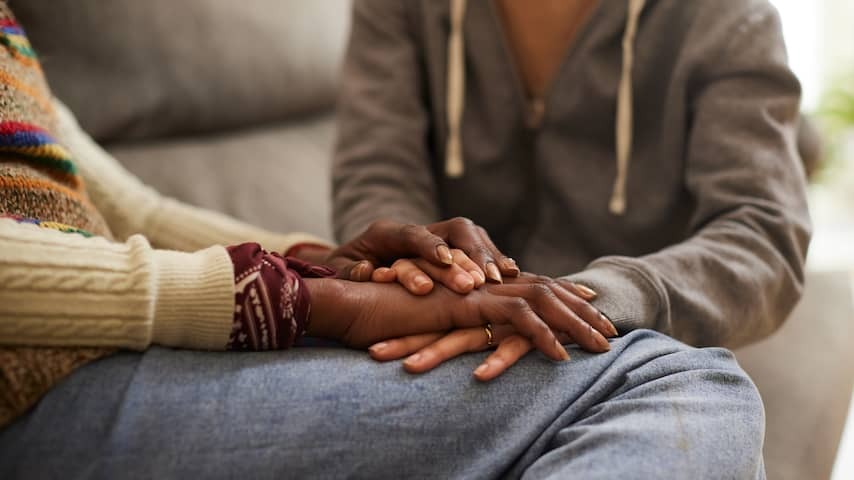
It is understandable that people do not know what to say when they hear the diagnosis. According to medical social worker Judith Kunst, this is because when you hear ‘cancer,’ you can imagine all sorts of things. Kunst works at the Antoni van Leeuwenhoek hospital and research institute and supports patients and their loved ones.
“Cancer has a very broad clinical picture. Someone can be helped with simple treatments or face death,” she says. “Therefore, first ask what kind of cancer someone has and what treatment they are receiving. Above all, ask how it has landed with someone. You can only connect well if you have this information. This way, you can tailor your reaction to someone’s clinical picture.”
Asking those questions can also be difficult. Psychologist Melissa van Buuren often hears that people find this difficult. She owns Psychology Practice Van Buuren, where she guides people dealing with cancer. “People feel uncomfortable and are afraid of saying something wrong,” she says.
“But you don’t have to find the perfect words. The most important thing is to listen with empathy and be honest about your own feelings. You can indicate that you don’t know what someone is going through or don’t know what to say.”
‘Patients see in the eyes of others how intense it is’
Eline Aukema is a healthcare psychologist and head of the Ingeborg Douwes Center for psychological (after)care for cancer. She also advises being honest about your feelings.
“Say it if you are afraid of asking the wrong questions. Reactions from the environment are often more intense when it comes to cancer in children or young adults. That happens much less often, so it is seen as very painful. Patients see in the eyes of others how intense it is.”
Although you may want to reassure someone, it is best to avoid exaggerated optimism. “With this, you can trivialize the experience of the other person,” explains Van Buuren. “For example, don’t say that the person will definitely get over it. That person may be afraid of dying.”
Immediately after someone has heard that they have cancer, an uncertain time begins for patients and loved ones. “It’s a complicated phase,” says Kunst. “Someone knows it’s cancer, but research sometimes still needs to be done. That phase can take weeks and is the most difficult. You don’t know how bad it is yet. Loved ones also feel that fear. Very often it is also said that you don’t have cancer alone.”
Loved ones who are very close, such as the partner, are more caregivers and must maintain that role throughout the treatment process and the recovery period. “That caregiver must also be able to take care of themselves,” says Aukema. “People from the environment can help with this. You have the inner circle, such as the father, mother, children or partner. You also have a circle around it, such as friends. They can relieve the caregiver or patient.”
Patients often find it important to be seen and heard, Kunst knows. “But it is important to coordinate this with each other. I hear from many patients that they prefer to go for a walk than to receive a visit at home. A visit also means tidying up and doing groceries. One person likes to receive a lot of messages, while the other prefers to contact you themselves and benefits more from a bowl of soup. Therefore, ask how you can help someone.”
‘Do not neglect yourself’
Offer as specifically as possible what you can do for someone, all three experts advise. “For example, say that you will take someone to the hospital once or take the children to the zoo once. No one responds to an open question such as ‘call me when I can do something for you’. That is too broad a question and people already find it difficult enough to ask for help.”
When offering help, it is also important to indicate what is feasible for you. By specifically suggesting what help you can offer, you also indicate your own limits. “Loved ones should not neglect their own well-being. That is often the danger. People want to turn their lives around to take care of someone, but a trajectory can take a long time. When that is over, you see how much impact that has. It is important to prevent emotional exhaustion.”
Kunst also sees that loved ones often want to efface themselves. “Don’t put everything on hold immediately,” she advises. “If tennis is important, keep playing tennis. Still meet up with friends. Make sure that relaxation is still there.”
According to Van Buuren, it is good to continue seeing friends so that you can share your story. “Even if you do the things that are important to you less often, keep doing them. It can help to talk about it with friends or family members. That doesn’t necessarily have to be a helper, such as a psychologist or practice nurse. Although you can always go there if you can’t get any further with this.”